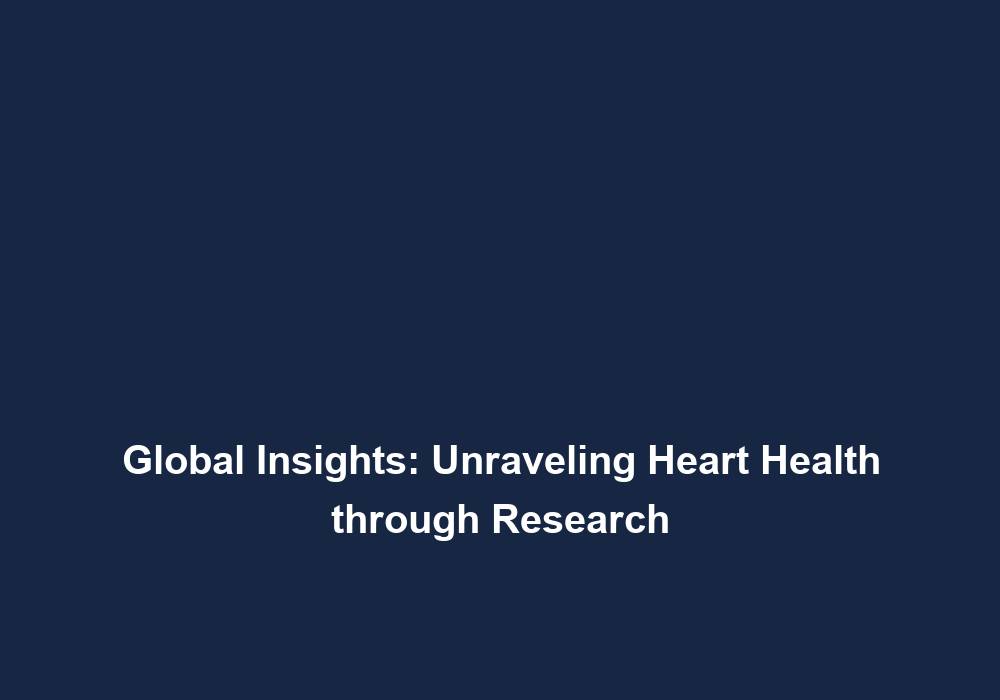Global Insights: Unraveling Heart Health through Research
Heart health is an essential aspect of overall well-being, and extensive research plays a crucial role in understanding and improving cardiovascular health worldwide. The insights gained from global research studies provide valuable information, allowing us to unravel the complexities of heart health, identify risk factors, develop preventive measures, and explore innovative treatments. In this article, we will delve into various aspects of heart health research, shedding light on its significance, recent breakthroughs, and emerging trends.
The Importance of Heart Health Research
Research focused on heart health is vital due to the increasing prevalence of heart diseases and their impact on global mortality rates. According to the World Health Organization (WHO), cardiovascular diseases are the leading cause of death worldwide. Therefore, understanding the underlying causes and identifying effective prevention strategies are of paramount importance.
Benefits of Heart Health Research:
-
Prevention and Early Detection: Research plays a pivotal role in identifying risk factors associated with heart diseases, allowing for preventive measures. By understanding the various risk factors, individuals can take proactive steps to reduce their chances of developing cardiovascular problems. Early detection of cardiovascular problems can significantly increase the chances of successful intervention and treatment. Regular check-ups, screenings, and monitoring can help identify potential issues before they become severe.
-
Improving Treatment Options: Through research, scientists and medical professionals can uncover new treatment methods and therapies, enhancing patient care and outcomes. Advances in technology and medical interventions have provided opportunities for innovative treatments that were once unimaginable. For example, the development of minimally invasive procedures, such as cardiac catheterization, has revolutionized the treatment of heart diseases. Additionally, the use of medications, such as statins, has shown great promise in managing cholesterol levels and reducing the risk of heart attacks.
-
Enhancing Public Health Policies: Research findings shape public health policies, leading to improved guidelines for heart health promotion and disease prevention. This translates into better overall population health and reduced burden on healthcare systems. Public health campaigns, education initiatives, and policies aimed at reducing smoking, promoting healthy diets, and encouraging physical activity have all been influenced by heart health research. These efforts help create a supportive environment for individuals to make heart-healthy choices.
Recent Breakthroughs in Heart Health Research
Over the years, numerous breakthroughs in heart health research have revolutionized our understanding of cardiovascular diseases, prevention strategies, and treatment options. Let’s explore some of the recent advancements that hold significant promise:
1. Genetic Research and Personalized Medicine
Advancements in genetic research have shed light on the genetic factors that contribute to heart diseases. By studying genes, scientists can identify individuals at a higher risk of developing cardiovascular problems. This information enables personalized medicine, allowing tailored treatment plans and interventions based on an individual’s genetic makeup. Genetic testing can help identify specific mutations or variations that increase the risk of heart diseases, enabling healthcare professionals to provide targeted interventions and preventive measures.
2. Remote Monitoring and Telemedicine
Remote monitoring technology and telemedicine have transformed the way cardiovascular diseases are diagnosed and managed. Devices such as wearable sensors, remote patient monitoring systems, and teleconsultation services enable healthcare professionals to remotely monitor patients’ heart health, provide timely interventions, and improve access to specialized care, especially in underserved areas. Remote monitoring allows for continuous tracking of vital signs, such as heart rate and blood pressure, enabling healthcare providers to detect any abnormalities and intervene promptly.
3. Artificial Intelligence in Cardiology
Artificial intelligence (AI) has emerged as a powerful tool in cardiovascular research and patient care. AI algorithms can analyze vast amounts of data, identify patterns, and predict heart disease risks with high accuracy. Additionally, AI-powered imaging techniques aid in the early detection of cardiovascular abnormalities, enabling timely interventions. For example, AI algorithms can analyze medical images, such as echocardiograms, to detect subtle changes that may indicate the presence of heart diseases. This technology assists healthcare professionals in making accurate diagnoses and developing personalized treatment plans.
4. Lifestyle Modifications and Prevention
Extensive research emphasizes the role of lifestyle modifications in preventing heart diseases. Studies have shown that adopting a healthy diet, engaging in regular physical activity, managing stress, and avoiding harmful substances like tobacco and excessive alcohol significantly reduce the risk of cardiovascular problems. Research in this area aims to develop effective interventions and strategies to promote heart-healthy lifestyles. For instance, educational programs and community initiatives can encourage individuals to make positive changes in their lifestyle habits, leading to improved heart health outcomes.
Emerging Trends in Heart Health Research
As technology and medical knowledge continue to evolve, new trends emerge in heart health research. These trends hold promise for further advancements in the prevention, diagnosis, and treatment of cardiovascular diseases. Here are some notable emerging trends:
1. Precision Medicine and Biomarkers
Precision medicine focuses on tailoring medical treatment to an individual’s unique characteristics, including genetic makeup, lifestyle, and environment. By identifying specific biomarkers associated with heart diseases, researchers aim to develop targeted therapies and interventions. This approach ensures a more personalized and effective approach to heart health management. Biomarkers, such as certain proteins or genetic markers, can help predict the likelihood of developing heart diseases and guide treatment decisions.
2. Nanotechnology and Drug Delivery Systems
Nanotechnology holds immense potential in the development of targeted drug delivery systems for heart disease treatment. Nanoparticles can be engineered to transport medication directly to affected areas, improving drug efficacy while reducing side effects. This emerging field of research offers exciting possibilities for more precise and efficient treatment options. For example, researchers are exploring the use of nanotechnology to deliver drugs that can prevent the formation of plaques in the arteries, a common cause of heart diseases.
3. Big Data Analytics and Predictive Modeling
The analysis of large datasets, commonly referred to as big data analytics, coupled with predictive modeling, allows researchers to gain valuable insights into heart health. By analyzing vast amounts of patient data, researchers can identify hidden patterns, predict disease progression, and develop personalized treatment plans. This trend in heart health research has the potential to revolutionize preventive medicine. For instance, predictive models can help identify individuals who are at a high risk of developing heart diseases, enabling targeted interventions and preventive strategies.
4. Stem Cell Therapy and Tissue Engineering
Stem cell therapy and tissue engineering are promising areas of research for heart disease treatment and regeneration. Stem cells have the ability to differentiate into various cell types, offering the potential for repairing damaged heart tissue. Researchers are exploring the use of stem cells to regenerate heart muscle, improve cardiac function, and ultimately enhance patient outcomes. This field of research holds promise for developing innovative therapies that can restore and rejuvenate the heart, offering hope for individuals with severe heart diseases.
In conclusion, heart health research plays a crucial role in unraveling the complexities of cardiovascular diseases, identifying risk factors, and developing preventive measures and innovative treatments. Recent breakthroughs in genetic research, remote monitoring, artificial intelligence, and lifestyle modifications have significantly advanced our understanding and management of heart health. Emerging trends, such as precision medicine, nanotechnology, big data analytics, and stem cell therapy, offer promising avenues for further advancements in heart health research. Continued efforts in this field are essential to reduce the global burden of cardiovascular diseases and improve the overall well-being of individuals worldwide.







